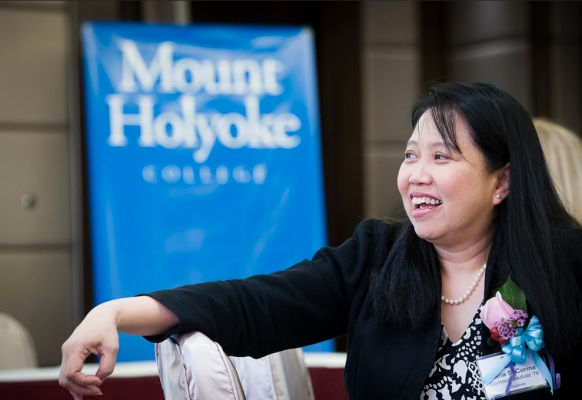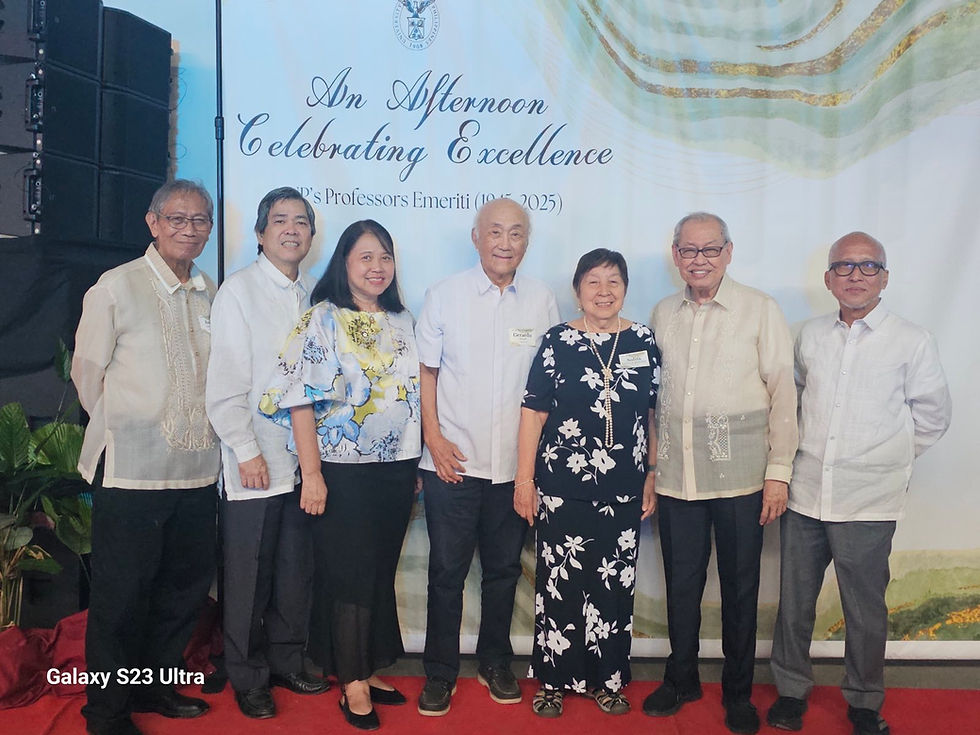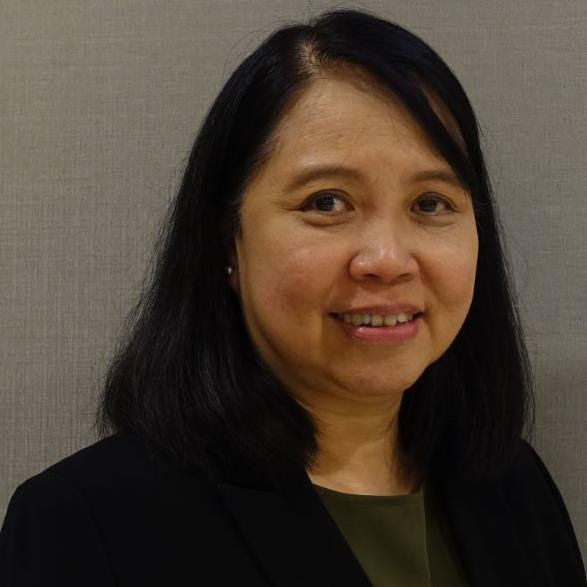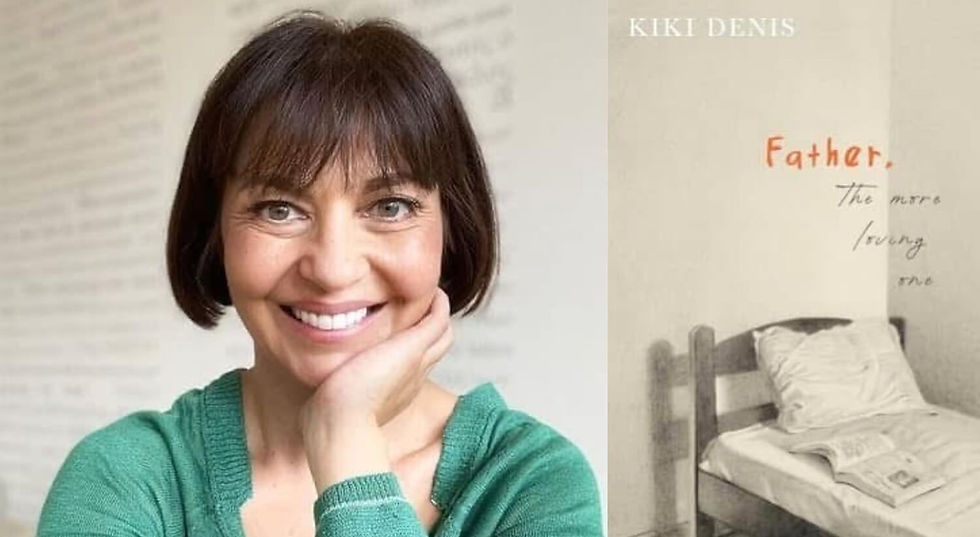Maria Socorro Gochoco-Bautista '78 - Philippines
- MH Global Alum Alliance

- May 31, 2025
- 9 min read
Updated: Oct 23, 2025
We are delighted to share our first Global Alum Alliance feature interview, as we begin to share the lives and achievements of alums around the world. This In the Spotlight interview focuses on Maria Socorro Gochoco-Bautista (Corina) Class of '78, Professor Emeritus of Economics and Mount Holyoke Country Head for the Philippines.
Please get in touch if you feel your story would be of interest, or would like to recommend a fellow alum!
Spotlight on…
Name: Maria Socorro Gochoco-Bautista (Corina)
Class Year: 1978
Country: Philippines
Profession: Professor Emeritus of Economics

"I have always regarded being a teacher as belonging to the noblest of professions. I still love seeing the reactions on my students’ faces when they learn something new or something profound. It is priceless. I feel a sense of immortality seeing how my former students are now finding their way in the world."
Maria Socorro Gochoco-Bautista, or Corina for short, has led an inspiringly international life, living, studying and working across Europe, the US and Asia, from Germany to Hawaii, Hong Kong to the Philippines. She has worked as a senior economist in multiple fields, from academia to NGOs to international financial institutions. She is also the Mount Holyoke Country Head for the Philippines! In this In the Spotlight interview, Corina describes the twists and turns of her life, why the study of economics is so important, and how Mount Holyoke impacted her incredible journey.
1) Can you tell us a little bit about yourself?
I am a Professor Emeritus at the University of the Philippines Quezon City, and have been at UP since 1987, before retiring in 2022. I was born and raised in the Philippines but spent 3 years living in Europe, specifically in The Hague and Hamburg, when I was a young child (and so I also spoke Dutch and German at a point in my life) as my father, who was with Shell, was in training there.
I decided to study in the US because at the time, the Philippines was under a dictatorship, and I felt that I would not get a proper education under those conditions. After Mount Holyoke, I went to Columbia and graduated with a PhD in Economics. I had a tenure-track faculty position at the University of Hawaii at Manoa but spent only three years there.
In 1987, after 13 years in the US, I decided to return to my country following the People Power Revolution which toppled the Marcos dictatorship and sent him and his family to Hawaii! I felt that my country had been given a great opportunity to chart a new growth and development trajectory, and I wanted to contribute something toward that end.
I joined the University of the Philippines School of Economics faculty and also became an advisor to the Secretary of Socio-economic Planning (whose daughter also happens to be a Mount Holyoke alum). I also joined an NGO associated with the ASEAN Security Studies group, travelled extensively in ASEAN, and engaged in “Track II” work. I was Visiting Scholar at the Federal Reserve Bank of San Francisco in 1991, Senior Research Fellow at the Bank for International Settlements (Hong Kong office) in 2006-2007, Senior Economic Advisor at the Asian Development Bank from 2010-2015, the first woman to hold this senior management position, before returning to the University.

During my professional career I received several awards, including the title of UP Scientist 3, the highest honor bestowed by the University for scientific productivity, and the MHC Alum Association Achievement Award. I am now the proud President of the Mount Holyoke Club of the Philippines as well as Class’78 co-scribe.
I married a fellow academic economist when I was 34 and did not think I would ever marry. We were blessed with two sons who were both educated in the US and who also have PhDs, and are academics as well. One teaches economics at Fulbright University in Vietnam and the other is a physicist who teaches data science at the Asian Institute of Management here.
2) What inspired you to enter the academic world?
Both of my paternal grandparents were professors. My grandfather was a professor of civil engineering. My grandmother was a professor of Spanish. At a time when it was very unusual for a woman to go to college or to have a career outside the home, she had a master’s degree (in science) and became a professor.
I grew up in my paternal grandparents’ family compound and would watch my grandfather grade bluebooks! Academic excellence was always something that was emphasized growing up, and my grandfather regarded it as important to keep the family’s good name. We spent a lot of time together, especially during the family lunch on Sundays, when we would all troop to the big house, my grandparents’ house. We always had interesting discussions about issues of the day around the table for the adults, which I joined instead of the one with my cousins. I was exposed to academic life from early on and saw that it was possible to have both a happy family life and a fulfilling career.
3) Why did you choose to study Economics?
Growing up, my dad would drive my sister (who is also a Mount Holyoke alum as is her daughter) and I to our private school daily and I would see these slum areas along the railroad tracks next to the highway. I wondered what one could do to understand this condition of poverty amidst wealth and find ways to help uplift people’s lives. I thought that becoming an economist would serve that purpose.
My uncle, my dad’s older brother, who was also my godfather, had a PhD in Economics from the University of Manchester. He also had degrees in engineering (the family staple), and in architecture, but he was the first one in the family to have a degree in economics. He had a distinguished career in the public sector in the Philippines, and he definitely was my role model to become a professional economist.

4) What is the favorite part of your job and why do you love being a professor?
Well, first of all I chose a lifestyle, not a career. An academic really has no boss and your time is pretty much your own to allocate. This was important to me as a woman who might one day start a family, to be present in my children’s lives (although there was a time I thought I would never marry and have a family).
Also, I did not think I could enjoy the rat race in the private sector, sitting at my desk for 8 or more hours a day and trying to impress a boss. The academic life is probably the freest one I know of, where Die gendanken sind frei (Thoughts are free). In my role as a professor, I was free to express my thoughts freely, debate issues openly and pursue any kind of research I was interested in. The mind is not idle, and a scholar’s life is meant to always try to push the envelope of knowledge further. It is never boring or routine.
One does not have to cozy up to a boss to be promoted or tow the company line. I never felt that I needed any other title besides “Professor.” In a Japanese class at Columbia (which I took when I only had a dissertation to write and felt I needed some structure in my life and could not wait for deferred gratification), I learned that the character for the word “teacher” means “the one who came before”. My professor said that this is because “the one who came before” embodies wisdom.
I have always regarded being a teacher as belonging to the noblest of professions.
I still love seeing the reactions on my students’ faces when they learn something new or something profound. It is priceless. I feel a sense of immortality seeing how my former students are now finding their way in the world.
5) What are some of the biggest challenges that you had to face in your professional life?
One challenge that I have faced was/is being a woman in a male-dominated profession. There were very few female role models I could look up to when I was a grad student, Ana Schwartz and Joan Robinson (who should have won a Nobel Prize) are the only ones that come to mind from that generation. I met Ana Schwartz when I was in Hawaii, and she was very encouraging and advised me to even apply to this Ohlin Fellowship at the National Bureau of Economic Research (NBER). It would have been nice to have had more women in the profession then.
Today, there are two women Nobel Laureates, and others who hold prestigious positions, like the MD and former Chief Economist at the IMF, Gita Gopinath, and Carmen Reinhart, my classmate at Columbia, now a Professor at Harvard Kennedy School and was formerly Chief Economist at the World Bank. However, I am still in the minority at all the conferences I attend. I do not mind nor notice it anymore. Over the years, I’ve just gotten used to it and I have realized that it is the substance of my interventions or presentations and not my gender that matters. I have just never been intimidated at being the only female in any group because of the self-confidence MHC instilled in me and the unquestioned fact that women belong at THE table.
6) What is your advice to young women who wish to pursue a career in Economics?
Prepare well. Whether you go to grad school or not, take a lot of math courses, learn to code, as these are the languages of the profession today. When I was in grad school, I realized that although I had taken many math courses in college, these were insufficient for graduate school. These days, incoming PhD econ students need to go through math camp in the summer before starting grad school.
Also, don’t go into economics because you want a job at the IMF or the World Bank or the Asian Development Bank, in Wall Street, or even a top 100 university in the US. Where one works or how much one earns is less important than how meaningful and fulfilling what you do makes you feel, especially toward the end of your life when the marginal utility of another dollar is pretty low! I know many people who retired from international organizations and have large pensions who then desperately search for jobs (mostly in university) that they feel will somehow give their lives meaning. It is sad.
The point of a career is to be able to have an interesting, meaningful life one can look back on and say, well done, no regrets. Someone once said that at one’s death bed, no one ever says, “I wish I had stayed longer at the office.” The point is to have a joyful and meaningful existence.

7) How did your MHC experience contribute to your life aspirations?
Mount Holyoke taught me to not just be satisfied with meeting minimum standards. It made me realize that there is so much to learn about the world and that if I only exerted some effort, I could grab these numerous opportunities presented to me. This is why I am always so grateful to have gone to Mount Holyoke. I don’t think, for example, that I would have been admitted to Columbia University , were it not for Mount Holyoke’s great reputation as an academic institution. I had not intended to go to grad school when I entered Mount Holyoke, but I had such a wonderful academic and overall experience there that by the time I graduated, I could not imagine not going on to grad school.
Mount Holyoke taught me to be confident in myself and in my natural abilities, and that no matter what was thrown at me, if I just persevered a bit, I could figure it out. This is because my teachers at Mount Holyoke always had such confidence in their students and always treated students as their intellectual peers, people they could learn from, not just people to mentor and teach.
8) Can you share some of your fondest memories of MHC?
I remember that there were very few Asian-looking people on campus when I was there. We started the Asian group with very few members and now the Asian student population at Mount Holyoke is phenomenal. One can hear Asian languages spoken on campus; the main dining facility regularly offers Asian cuisine. This is very different from when we were there. We would have to go to Amherst to eat Chinese food at that one restaurant in town if we missed having rice!
I remember many things about dorm life: enjoying ice cream with jimmies at the Rathskeller snack bar in Mary Wooley next to North Rocky, popcorn parties in our tiny basement room, milk and cookies after a night of studying at the library, mixers with the few guys from the Amherst Asian Group. Some of them remain friends to this day, including my brother-in-law, (Amherst went coed in our sophomore year). I also remember learning to ice skate on Lower Lake with my Amherst friend, watching classic movies of Hepburn and Tracy on campus on weekends.
I also have great memories of how wonderful and outstanding my professors were, in particular Ruth Lawson (Political Science), Ellison Findlay (Religion), and George Cobb (Math). Not only did I learn profound things in their courses, but they also made me appreciate the role of a great teacher in a student’s life. If anything, the bottom line is to not kill the natural enthusiasm of the student for the field and instead, to help a student discover her natural enthusiasm for it, which she may have been unaware of.
I remember the kindness of faculty and fellow students in my dorm, who made sure that I always had a place to visit on Thanksgiving, which I discovered is the biggest and most American of holidays. Together with a small group of foreign students, I recall a trip to Lexington and Henry David Thoreau House in my freshman year with the Foreign Student Adviser, Mrs. Potter. An American student in my dorm I had invited to watch a movie sponsored by the Asian group invited me to spend Thanksgiving at her home in beautiful Cape Elizabeth, Maine. As a result, I never felt alone or lonely at MHC. I felt that I was part of a family, a community.
Interview conducted Spring 2025 by Eleanor Chang '78 and Silvia Maulini '80



